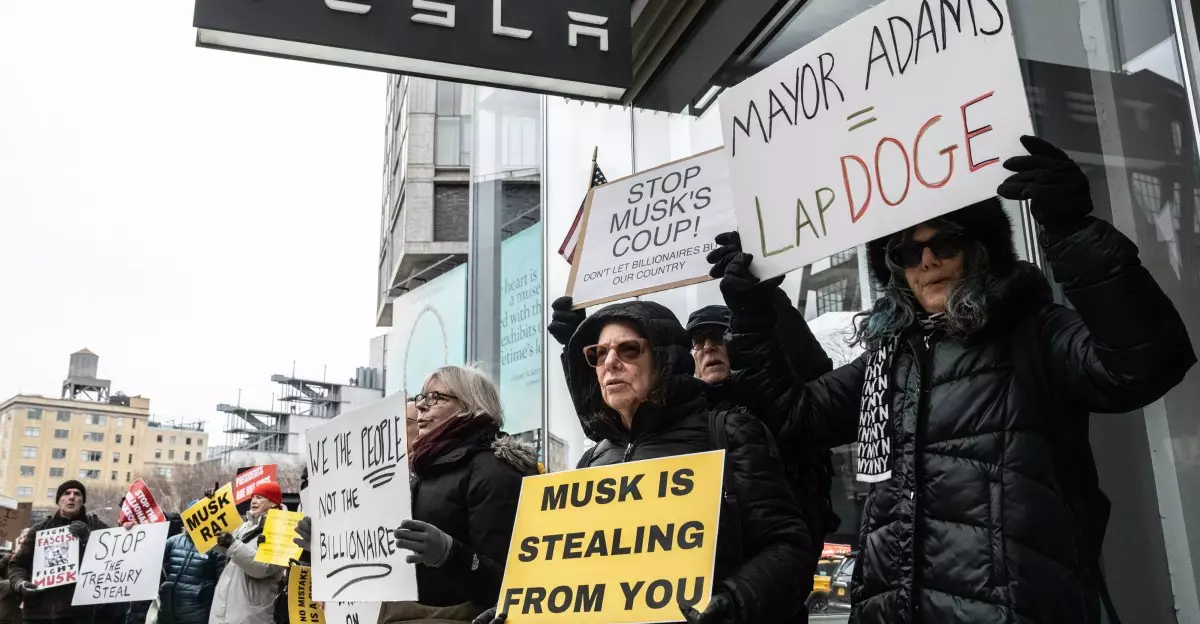In a display of dissent reflecting growing public sentiment, protests have erupted outside Tesla showrooms across various cities in the United States and beyond. Utilizing the trending hashtag #TeslaTakeover, demonstrators are vocalizing their discontent with CEO Elon Musk’s controversial positions, particularly his leadership role in the Department of Government Efficiency under former President Donald Trump. This movement marks the second consecutive weekend of protests that seem to capture a cumulative frustration directed not just at Musk but also at the broader implications for corporate ethics in relation to political affiliations.
While the protests might not be vast in numbers at each location, their geographic spread—from urban centers like New York City to suburban communities like Golden Valley in Minnesota—suggests a significant wave of anger crossing regional boundaries. The messages being circulated are poignant and pointed, questioning Tesla’s ethical compass under Musk’s stewardship and reflecting a substantial concern regarding the broader implications of corporate influence in politics.
Tesla’s investors are increasingly anxious about the repercussions of Musk’s activities on the company’s market performance. Stock prices have reportedly fallen by 21% since Trump’s inauguration, signaling potential instability—an unsettling development for shareholders who have heavily invested in Tesla’s future. Internally, this anxiety has reverberated to employees, with some senior staff expressing that the company would fare better without Musk at the helm, as reported by The Washington Post.
This tension raises critical questions regarding leadership accountability and corporate governance. In a world where corporate leaders increasingly wield significant political power, how should shareholders and the public react to decisions that reportedly compromise the integrity and performance of a company? The protests are not merely about requesting Musk’s resignation; they also symbolize a public unwillingness to accept ignorance of corporate ethics.
Voices of Dissent: Cultural Figures and the Narrative
The protests have attracted diverse voices, including that of actor and activist Alex Winter, who published images of himself advocating for people to sell their Teslas in Pasadena, California. His prominent social media presence amplifies public sentiment and brings additional visibility to the cause, making it evident that the protests are not solely dominated by specific activist groups.
Musicians like Sheryl Crow have also taken to social media to express their discontent, illustrating the intersection of celebrity influence and public activism. Crow’s poignant farewell note to Tesla, accompanied by the sight of her vehicle being towed away, underscores the significance of personal choices in a political climate fraught with ethical dilemmas associated with an influential figure like Musk.
In this digital age, the protestors have embraced platforms like Bluesky to articulate their grievances, creating a space for organization and activism. The stark contrast between engagement on Bluesky versus other social media platforms such as X, Instagram, or Threads points to evolving tactics in protest movements. The ability to mobilize efficiently online has transformed the nature of activism; hashtags like #TeslaTakeover are becoming vehicles for collective action, enabling a grassroots movement to thrive.
However, the effectiveness of such protests cannot be solely measured by their ability to draw attention online. While numerous demonstrations are anticipated to coincide with public holidays and political events, it remains to be seen whether these actions can effect real change, especially in markets and numbers that may not be directly influenced by online trends.
As protests continue and more events are planned, including demonstrations during President’s Day in cities such as Lowell, Maine, and Richmond, Virginia, the grassroots effort appears set to grow. The challenge lies not only in maintaining momentum but also in translating public sentiment into meaningful shifts within the corporate structure of Tesla.
The mounting protests against Tesla encapsulate a broader cultural dialogue regarding the ethics of corporate leadership intertwined with political affiliations. This scenario paints a complex picture—one that necessitates scrutiny and reflection on the role influential figures play in shaping corporate identities and how consumer behavior can invoke change. As activists galvanize their forces, the world watches to see if their unified voice will resonate beyond the confines of social media and fuel tangible outcomes in corporate governance.


Leave a Reply